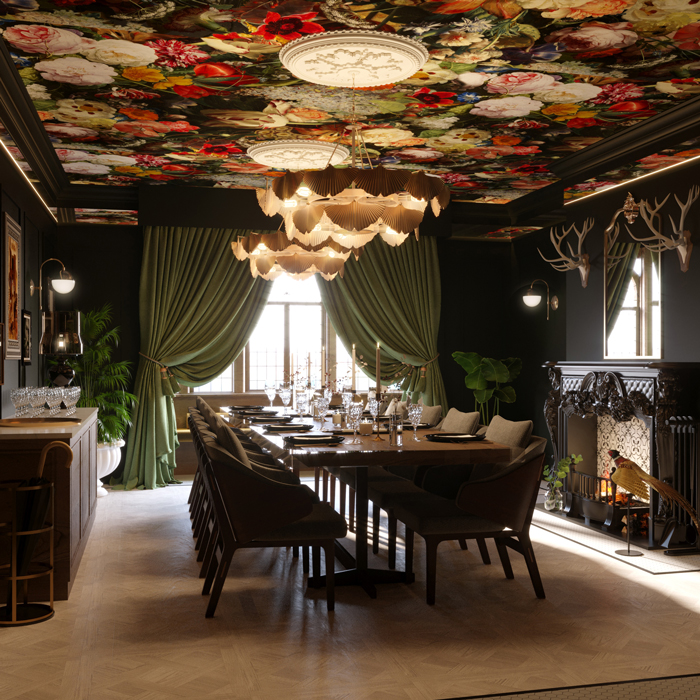Quietness With Attitude – HIX EVENT CONVERSATION
Design Insider is delighted to be running a series of articles to promote conversations on the seminar topics that will be presented at the Hotel Interiors Experience – HIX – at the Business Design Centre, London on 18/19th November 2021. The topics will discuss six social shifts that are taking place in our post-pandemic world as all we all move towards opportunity, the light, somewhere better.

The next subject we are discussing is for the seminar entitled “Quietness With Attitude”.
‘Wellness’ has been a staple topic on hotel conference stages for the last 10 years, and we still feel compelled to include it on ours. Covid pressed ‘fast forward’ on the mental health and wellness conversation, removing social taboos, and heightening people’s awareness of wellbeing, their own and of those around them. HIX will create immersive installations within the event – think slow design, silent architecture and design for wellbeing. Thankfully, this conversation isn’t going away and it remains firmly on the agenda as hotels and guests’ journey towards an enlightened understanding of wellbeing.’
The sponsor of this seminar, Hansgrohe, gave us their view:
‘Designing for wellness has never been more important. The mental and physical health impact of the last 18 months has opened up important conversations around personal and corporate wellbeing, so much so that designers and architects need to work increasingly harder to create spaces that calm, rejuvenate and cocoon its users. Whether through applying biophilic principles, using clever lighting and layouts, or simply harnessing the restorative power of water when it comes to bathroom planning, good design has the power to transform the guest experience. Hansgrohe, with its brands AXOR and hansgrohe, is delighted to be sponsoring this event where such an important topic is top of the agenda.’

Hotels are cocoons and centres of indulgence, as in this private dining room at Wildes Hotel, visual by SpaceInvader
We asked Chris Gwyther (CG), Founder of hospitality and retail designers Phoenix Wharf and John Williams (JW), Founder, SpaceInvader for their thoughts.
Why is it important for society to address the mental and physical health impact of the last 18 months?
CG: Mental and physical wellbeing were key pre-pandemic topics and their urgency has only accelerated following lockdown’s social isolation and restrictions on social liberties. A simultaneous growing awareness of our environmental emergency also helped create a perfect storm of fear and anxiety. At the same time, pre-pandemic life had become frantic, with mobile and digital technology blurring work-life boundaries, so COVID-19 may have also been a positive catalyst for change as, for the first time in a generation, people stopped and truly re-evaluated their lives. The fallout will filter through over months and years, resulting in a significant social and cultural shift, not dissimilar to that of the immediate post-war periods. This coincides with the continuing shift of power from business / brands to the consumer. Operators will need to keep a keen eye and ear out for the consumer mood.
JW: For too long, our understanding of wellbeing was limited to physical fitness. When it came to mental health, we often reacted only when things reached crisis point. The wellbeing focus that dominated conversation directly preceding the pandemic served as a great educator for us all, moving our understanding on with regard to both mental health issues and the huge numbers of non-NT people who react differently to and have different needs from their designed environments. We all know of people who struggled during lockdown – including most of us at different points – so the numbers affected in the last 18 months are substantial. We need knowledge, awareness and open conversations now because that impact will only be more damaging later if it’s suppressed or forgotten.
Do hotels already have wellness at the heart of their guest experience?
CG: Some, but certainly not all. The hierarchy of needs addressed by any single hotel is still mostly determined by location. A rural, country retreat hotel is far more likely to put guest wellness at the heart of its offer, for example, from quietness and relaxation to great food, comfortable rooms, country walks and spa facilities. An inner-city hotel, however, will remain primarily focused on convenience, appealing to business guests and short city-break customers. Even if that fundamental hierarchy doesn’t change, all hotels should be looking to integrate more thinking about guest wellbeing into their offer.
JW: Yes and no. Hospitality exists to take away the stresses and hassle of everyday life, whether that’s by having someone give you a warm reception in a great environment or preparing your meals or making your bed. Hotels are where we escape to from everyday life, so they’re about being cocoons and centres of indulgence. They can be anything from functional to fun, but they mostly have indulgence and relaxation at their core rather than wellness per se.
Do you have examples of hotels which do this successfully?
CG: A hotel in our local south-west area that does this – and everything else – well is The Newt in Somerset. It never ceases to amaze me how many people know about it or have been – without necessarily being overnight guests. The hotel has a real role in the community and is a complete ecosystem with accommodation, a spa, botanical rooms, restaurants, gardens, farmyard and an orchard. In addition, they have things like seasonal workshops, events and educational attractions for adults and children alike. There’s always a reason to go back, whilst for the operator there are multiple revenue streams, including a reasonably-priced annual membership. Everything they do is also stunningly executed. The hotel is an icon of calmness and beauty and represents a real escape from day-to-day life.
JW: There are many hotels with a strong health-based offer, serving as retreats for yoga breaks or, as in the Germanic tradition, effectively merging the old-fashioned sanatorium with modern-day hospitality. The accent is very definitely on physical wellness and mindfulness, however. I think we have yet to see a hotel that truly places both physical and mental wellbeing at its core in everyday situations.
Has this changed in recent years or months?
CG: Behind the scenes, this conversation is absolutely happening, along with taking on board residual visitor concerns about the proximity of other guests and staff and a stronger accent on cleanliness protocols, but it is too soon to determine what the full extent of the post-COVID world will look like.
JW: People are talking about it more, but in fact the hospitality industry, having been so far ahead of workplace design for so many years, is perhaps now a little behind. The thinking that’s gone into the variety of different spaces and paces in workplace and the technical investment in acoustics, daylight provision and colour psychology may hold lessons for hotels. Lighting is a key area. We’re working a project right now where every single light, including even the LED strips around the lift, changes during the day to ensure lux levels are always not only appropriate and up to the task, but constantly prioritise a calming effect.
In what ways can hotels facilitate self-compassion as part of their guest experience?
CG: As with many areas of life, there are valuable lessons to be learnt from the past. Golden periods such as the Edwardian era and the roaring 20s and 30s can be a valuable source of inspiration. These eras also emerged out of social and economic upheaval and were centred on enabling people to escape into fantasy, partying, rest, relaxation and indulgence. Health and wellbeing were central to that experience, leaving behind a great legacy of lidos, art deco architecture and seaside retreats with resplendent piers. The Edwardian response to the industrial revolution of the Victorian period is perhaps not dissimilar to the modern age retreat from the digital revolution. Just as now, there was a draw towards natural, organic forms, tactility and human-centric interaction, which culminated in Art Nouveau. Perhaps there will be a new golden age for hotels, underpinned by daring design and architectural vision?
JW: There are many ways hotels could innovate, including getting to know guests’ needs better prior to arrival and being aware of any conditions or issues with sight, sound or material colours or textures. Positive mental health could be addressed by additional services, from life coaches to sleep therapists, whilst cultural caretaking could expand to drawing classes and practical art sessions, for example, both addressing particular needs and adding offers that boost happiness and connection. A lot of ancillary services are being pioneered through tech too, with smart design in these areas meaning guests can access services such as meditation whenever it suits them.
Contact Phoenix Wharf
Contact SpaceInvader
The BCFA are a co-founding partner of Hotel Interiors Experience – HIX




